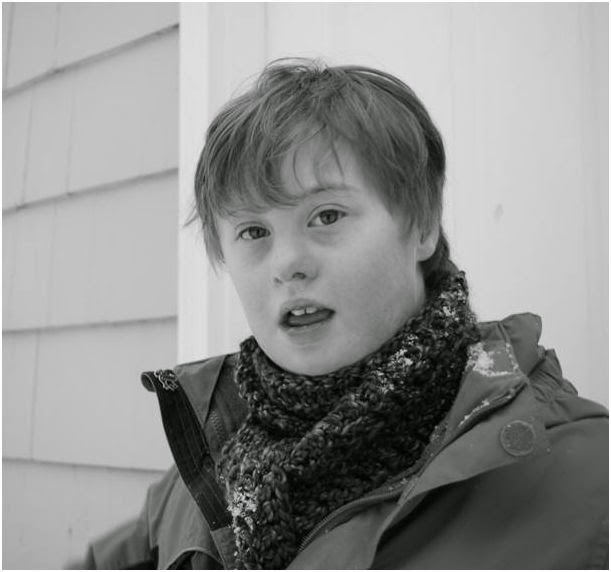
Know the Night is about a mother's isolation
Maria Mutch is awake. It’s 3 a.m., or maybe 4, she’s not sure—she can barely tell the difference anymore. She wanders the halls of her house slowly, quietly. While the rest of her family sleeps, Maria is a ghost. There’s no point in going back to bed. Any minute now, she anticipates that her eldest son Gabriel, who was born with Down syndrome and later diagnosed with autism, will wake up and begin his nightly babbling.
Gabriel is non-verbal and restless. He’ll cackle, or cry, and his shrieks and stomps will vibrate through the hallways, piercing the thick silence of the night. Maria—refusing her husband’s offers to help—will have to get up and calm Gabriel herself. So for now, she walks. She’s used to it, after all. The same thing happens almost every single night. It’s 2009, and Maria has been sleepless for nearly two years.
Today, five years later, Maria reflects on those long, sleep-deprived nights in her first book, Know the Night: A Memoir of Survival in the Small Hours. The book chronicles her experience caring for her son during the two years that Gabriel lived with a sleep disorder.
The book opens when Gabriel is 11. By then, he has stopped speaking. While he developed a small vocabulary as a very young child, by the time Gabriel turned five, he’d begun to lose most of the words he’d learned. By seven, he’d stopped speaking completely. The last two words he uttered were, poetically, “All done.”
Gabriel’s speech was replaced with outbursts of emotion and energy, and nightly marathons of screaming, laughing and slamming around in his room. “It was difficult because he was very affected by repetitive behaviours at that time,” Maria says. “He was very hyperactive and he did a lot of shrieking and bouncing in the middle of the night.”
Maria, her husband Robin, and younger son Sam sometimes communicated with Gabriel through jazz music, which he loves. The family often went to see local musicians, and in the small, sweaty bars, Gabriel found connection to the musicians and crowd when he bounced along with the music.
But back at home in what Maria calls the “small hours” of the night, she and Gabriel were often alone. She refused her husband’s offers to help, insisting on taking “ownership of the Odyssey.” Gabriel, his energy, his loss of words—they all seemed a mystery to her. Through her exhaustion and frustration, Maria struggled to understand Gabriel, and slowly began to make new discoveries about herself, the night, and the complexities of her son.
At the time, Maria was fascinated by the stories of explorers, and took particular solace in the journeys of Admiral William Byrd, who, in the 1930s, spent months alone in a hut in the Antarctic. In Know the Night, Maria weaves Byrd’s stories in with her own, and draws parallels between their mutual desperation and nocturnal isolation—as well as the profound beauty each of them find in the still loneliness of the night.
For Maria, Know the Night isn’t an “autism memoir,” but a piece of creative nonfiction that explores the isolation that both she and Gabriel faced at times. In this way, Maria feels that even those who haven’t cared for a child with disabilities can relate.
“It doesn’t matter where you are in the world, or what time period, that thing we all know is isolation,” she says.
She is also quick to point out that the book is about her own experience, not Gabriel’s. “I don’t look at it as writing for him because I’m very careful about making too many assumptions about Gabriel’s experience,” she says. “One of the things I want to protect with Gabriel is his autonomy.”
After two years, Gabriel’s sleep disorder passed. She and Robin still aren’t sure what changed their son’s nighttime habits. At some point, the screaming and bouncing stopped, and he just started sleeping again. As Gabriel slowly settled back into normal sleeping patterns, Maria began to write about her experience. She crafted a series of essays, then linked them together into a larger narrative. At first her reflections on her experience left her with a feeling of hostility.
“I was hit by a residual anger,” she says, “because I started getting rest and was reminded of what everybody else who sleeps normally gets to experience.”
Maria encourages parents who are caring for a child with disabilities who has difficulty sleeping to carve out time for their own self-care, and says that if she could do her two sleepless years over, she would have relied more on her spouse and advocated for her own rest. Most importantly, Maria says, parents shouldn’t try to do it alone.
“My husband and I hid the extent of what was going on. But you have to find some people in your circle that you trust, and that you can rely on for support.”
***
Today, Gabriel is 16. He still loves jazz, and in the mornings, Maria and Robin will set his iPod on shuffle and let the frantic, emphatic disjointed sounds fill the house. Thelonius Monk and Ella Fitzgerald and John Coltrane roar and whine and bawl out of the speakers. Gabriel sometimes still grooves along with them, but his body is more contained. His development has stayed the same for years, but in his movements, Maria sees a new maturity.
Mornings are easier now. Gabriel sleeps through the night, and is calmer during the day. While he still has some behavioural issues, he no longer wakes and shrieks the way he used to.
Moving forward, Maria says that as she wrote and reflected on her relationship to her son, she has learned to focus more on Gabriel’s enjoyment. “There’s a lot of pressure on parents to solve their kids’ issues. So we go through all these therapies, we read a ton of books. We go around the clock and it’s exhausting,” Maria says.
“We tried everything and now what I want for him is to have a great time. There’s no reason to feel sorry for Gabriel. He has a great existence. I want him to have a great life,” she says.
“And he does.”
Written by Megan Jones. Gabriel is pictured below.
